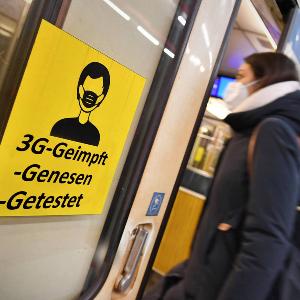LMU is part of the study "Coping with Corona" of life in the pandemic
29 Nov 2021
Researchers are accompanying people through their coronavirus routine to understand how they are coping with the crisis. More volunteers are needed.
29 Nov 2021
Researchers are accompanying people through their coronavirus routine to understand how they are coping with the crisis. More volunteers are needed.

© IMAGO / Sven Simon
The study Coping with Corona (CoCo) has set itself the goal of investigating how individuals are coping with the pandemic. The pivotal questions are: How are coronavirus-driven changes affecting people’s life and mental health? How and why do they deal differently with the same circumstances? And which strategies work best? The researchers hope that this exercise will reveal answers about how people can cope mentally with future crises.
Under the joint leadership of LMU-Professor Markus Bühner, Professor Mitja Back (WWU Münster) and Professor Maarten van Zalk (Universität Osnabrück), more than 50 renowned researchers from over 30 countries are taking part in this international project, with more cooperation partners signing up all the time. “What makes the study so special is the international approach and the modern methodology,” says Professor Markus Bühner, holder of the Chair of Psychological Methods and Diagnostics at LMU.
Using the experience sampling method, the participants will, by smartphone, be accompanied during everyday life and every evening for four weeks. They will also complete a short questionnaire four times a day. This will give the researchers an exceptionally authentic picture of people’s everyday feelings and experiences during the current phase of the pandemic.
“Every piece of the individual’s day-to-day puzzle helps us to better understand the complex relationships and interdependencies,” says LMU psychologist Dr. Ramona Schödel. There is no lack of variables in the equation: Many factors can influence how people react to the coronavirus situation. The researchers ask questions about the degree to which people are personally affected and use a personality questionnaire to gather as many useful details as possible in advance. They must also give due consideration to current developments in the pandemic situation.
Every piece of the individual’s day-to-day puzzle helps us to better understand the complex relationships and interdependencies.Ramona Schödel
“Our focus is on walking with people through their new corona routine,” says Thomas Reiter, an academic staff member at LMU’s Department of Psychological Methods and Diagnostics who is currently studying for his doctorate. Reiter sees experience sampling as a method very well suited to the task in hand, and the questionnaires are deliberately designed to take only a few minutes to complete.
More study participants are now needed: The more data the researchers can gather, the more valuable the findings will be for science. Anyone who is interested can sign up on the project website. During and after the four-week data gathering exercise, the participants will receive direct, individual feedback about findings related, for example, to their personal attitudes, the quality of their sleep and their productivity. People who take part in the study thus not only contribute to research, but also learn more about themselves and how they are dealing with the crisis.
Neither trends nor interim findings are yet available. “First and foremost, the results will of course be of interest as an aspect of psychological research and practice,” Reiter notes. That said, he also expects there to be implications for policy-makers – such as insights regarding when and for whom the requirement to work from home and other crisis-driven restrictions can be a particularly heavy burden.
In the spring, this international study will be complemented by a national study in which smartphone sensing is also used to collect data. Various sensors fitted in smartphones – such as gyrometers, GPS sensors and brightness sensors – will gather data via an app specially designed by LMU. At the same time, usage patterns across different apps will be recorded and analyzed. The result should be an exceptionally realistic picture of the participants’ behavior and experience.